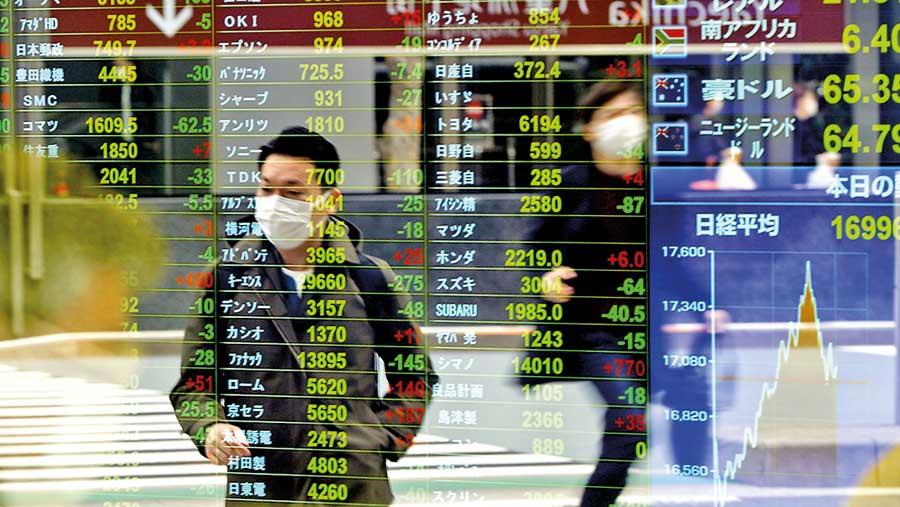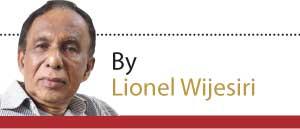Reply To:
Name - Reply Comment
Last Updated : 2024-04-17 02:11:00

Passersby wearing protective face masks following an outbreak of the coronavirus disease (COVID-19) are reflected on a screen displaying stock prices outside a brokerage in Tokyo, Japan, March 17, 2020.
REUTERS/Issei Kato - RC2ELF9MV301
The headline-making coronavirus continues to spread with nearly 5.0 million confirmed cases and 320,000 deaths across globally as at 19th May. 
There is no way to tell exactly what the economic damage from this pandemic will be. Too much depends on what is unknowable - how long the outbreak lasts, how many countries it afflicts badly and the extent to which a coordinated, concerted, fast-track policy response is mobilised and sustained.
The Covid-19 crisis will have a multifaceted impact on social, economic and political risks in Sri Lanka, but the extent of changes will depend largely on whether our Government will be able to contain the crisis relatively rapidly or whether it’ll persist for many more months.
As of now, the situation is remaining stable, since the country is put on lockdown and possibly elections postponed. The Government, in the meantime, is loosening fiscal policy to cushion the economic impact. The Government has repeatedly confirmed that they are fully equipped to face any unexpected eventuality once the lockdown is gradually relaxed.
"We have a country captured by a small group of billionaires and their lobbyists while we are going through extreme social inequality"
Next comes the second battle – facing the post-pandemic economic challenges needing much effort and skill to deal with and the magnitude of which could be frightening. This challenge will raise its head through a variety of channels, including trade disruption, drops in investment and finance flows, falls in commodity prices, the potential collapse of tourism, and of course the direct health and economic impact of the virus itself.
All of these channels will add up to a major disaster to our economy. Naturally, it signals a bad beginning for the President’s planned
economic revival.
So, what are we going to do about it? This is the priority issue and therefore, a question worth asking. But the answers appear elusive because we are faced with a global multifaceted crisis and not a national one. And, as far as Sri Lanka is concerned, our problems are also multi-faceted. We have a country captured by a small group of billionaires and their lobbyists while we are going through extreme social inequality. We witness the rise of some political leaders who seek support by appealing to popular passions and prejudices not caring about the adverse consequences. On top of all, we see the collapse of the common people who appear stunned, voiceless and clueless. Even if they dared to act, they have no idea what to do.
The Government has assured, that despite Corona pandemic, they will secure more economic growth. Yet, we witness ongoing ecological destruction. We also witness structural unemployment and soaring social inequality. If social values, principles and moral purpose are not there, the promise of economic growth makes no sense.
An adamant politician with different ideas might say, “All that counts is the rate at which we turn whatever our resources into cash. If in the process, it adversely affects our climate, environment or pollution, that cannot be helped. The priority is to bring cash to the treasury. We have to bring quick results”
"We see the collapse of the common people who appear stunned, voiceless and clueless. Even if they dared to act, they have no idea what to do"
However, any right-thinking citizen would agree that it is not the answer and it is obvious we cannot hope to address our country’s plight without a new economic model. We cannot use the models that caused our crises to solve them. We need to reframe the problem and find new answers.
Kate Raworth of Oxford University’s Environmental Change Institute in her book – “Doughnut Economics: Seven Ways to Think Like a 21st-Century Economist”, reminds us that we are wrong to treat the so-called “economic growth” to signify well-being of a country. The welfare of a country can scarcely be derived from a measure of national income. Economic growth, she points out, measures only annual flow, rather than stocks of wealth and their distribution.
The final aim of economic activity, Raworth argues, should be “meeting the needs of all within the means of the planet”. If we put it across to an individual country, what she means is instead of the country’s economy that needs to grow, whether or not they make us thrive, what we need is an economy that “make us thrive, whether or not we grow”. This means changing our thinking of the present economic model.
When this writer studied economics at the university nearly five decades ago, one simple diagram was at the heart of every macroeconomic textbook - and it still is. The Circular Flow of Income shows households providing labour and capital to firms, in return for wages, rent, and dividends. They spend that income on goods and services, and so it goes round.
However, this theory was operating in a social and ecological vacuum. Energy, materials, the natural resources, human society, power, the wealth we hold in common … all are missing from the model.
The unpaid work of carers – principally housewives – is ignored, though no economy could function without them. The central question we asked was this: what makes income grow, and what could make it grow faster?
Simple though it appears, this portrayal of the economy as a closed loop of money and resources gets quietly lodged into the brain of every budding macro-economist. And that’s a problem because it is fundamentally wrong.
"The Covid-19 crisis will have a multifaceted impact on social, economic and political risks in Sri Lanka, but the extent of changes will depend largely on whether our Government will be able to contain the crisis relatively rapidly or whether it’ll persist for many more months"
Raworth has redrawn a new economy model. She implants it in the Earth’s systems and society, showing how it depends on the flow of materials and energy, and reminding us that we are more than just workers, consumers and owners of capital. It was a graphic representation of the world we should create.
When you take a deep look at her model, you might even wonder why we didn’t think of it a long time ago because it is so simple and also practical. Of course, there are reasons. The influence of billionaire businessmen is the major one. For obvious reasons, they wouldn’t allow it to happen unless a tough political leader makes it happen.
As you can see, Raworth’s diagram consists of two rings. The innermost ring represents a sufficiency of the resources we need to lead a reasonably good life: good food, clean water, liveable housing, healthy sanitation, adequate energy, progressive education, world-standard healthcare and, above all, topmost democracy. Anyone living within that ring should not be in a state of deprivation. The outermost ring consists of the Earth’s environmental limits, beyond which we inflict dangerous levels of climate change, ozone depletion, water pollution, loss of forestry and species and other assaults on the living world.
The area between the two rings – the doughnut itself – is the “ecologically safe and socially acceptable space” in which people should strive to live. The purpose of economic policy should be to help the people enter that space and stay there. This space is derived from the UN’s sustainable development goals and agreed by world leaders of every political stripe.
If we agree with this model, there are a few facts the politicians and economists should understand. They must understand the limitation of human activities that can be allowed. They should also know about the human rights of the people, and the distribution of resources it will take to fulfill those.
With these fundamental concepts of globally, nationally and social boundaries in place, the task as an economist is crucial: to design policies, regulations, and markets that bring the responsibility of the policymakers and politicians to bring the people between the boundaries and enable them all to live and thrive there.
Raworth’s bestselling book has graced the bedside tables of many leading politicians and economists. It is described as a “breakthrough alternative to growth economics.”
It may be a good idea if our political leaders too would take a hard look at this novel concept while they are planning the post-Corona economic revival strategy.
Sakthiveal L Saturday, 23 May 2020 09:33 AM
An erudite article. Corvid-19 has shown that the earth gracefully heals herself when humankind consciously makes a decision to place well-being and welfare over all outputs. Perhaps a new normal - a fashionable post Covid-19 word -will be a government mandated industrial, agricultural, fisheries, services etc timeout .

Add comment
Comments will be edited (grammar, spelling and slang) and authorized at the discretion of Daily Mirror online. The website also has the right not to publish selected comments.
Reply To:
Name - Reply Comment
On March 26, a couple arriving from Thailand was arrested with 88 live animal
According to villagers from Naula-Moragolla out of 105 families 80 can afford
Is the situation in Sri Lanka so grim that locals harbour hope that they coul
A recent post on social media revealed that three purple-faced langurs near t

10 Apr 2024
09 Apr 2024